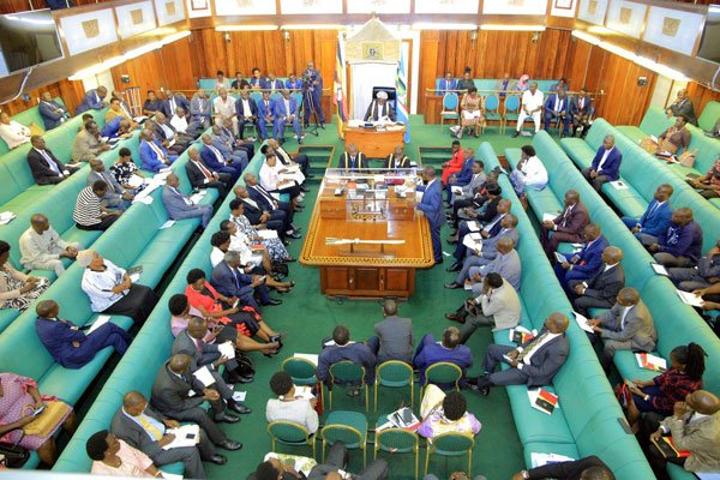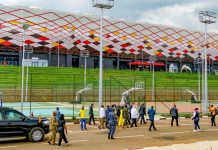Africa-Press – Uganda. Why are Members of Parliament (MPs) fascinated by the idea of increasing the term of office of elected leaders from five to seven years? Who is pushing the issue?
It has never been part of the raft of radical reforms that Ndorwa East MP Wilfred Niwagaba proposed while tabling the Constitution (Amendment) Bill, 2019, but the extension of the tenure of all political offices from five to seven years has become the biggest talking point around the Bill since the Speaker, Ms Rebecca Kadaga, closed debate on Thursday afternoon.
Mr Niwagaba has disowned the proposal, adding that the attempt to amend the Bill, which he tabled in December 2019 seeking to, among other things, eject the army from Parliament; put a cap of 21 to the number of Cabinet ministers; reinstate presidential term limits; scrap the Office of the Prime Minister and; introduce an elected Deputy President as opposed to a vice president, was an exercise in futility.
“It is of no consequence. They are wasting their time and it can only be wishful thinking. There is no way they can amend my Bill,” Mr Niwagaba told Sunday Monitor on Friday.
Mr Niwagaba had echoed the same sentiments in Parliament on Thursday as Ms Kadaga was bringing debate on the Bill to a close.The matter did not feature in a minority report that was written by seven members of the parliamentary Committee on Legal and Parliamentary Affairs led by Busiro County East MP Medard Lubega Sseggona, but appeared in the majority report of the committee.
The question now is how did it get into the majority report?Two members of the committee told Sunday Monitor in separate interviews that the proposal had not been part of the initial report. They claimed it was “sneaked” into the report after members had signed on copies of the report. Who then sneaked the item into the report?
Bugiri Municipality MP Asuman Basalirwa points an accusing finger at members of the committee who participated in compiling the report ahead of debate on the Rafael Magyezi report which culminated in the scrapping, on December 20, 2017, of the lower and upper age limits.
“Those who recommended the extension of the life of Parliament in 2017 are the same who brought it back,” Mr Basalirwa said.However, another member who talked to Sunday Monitor on condition of anonymity, points an accusing finger in the direction of the leadership of the committee. He claims he is reliably informed that the clerk to the committee had been instructed to insert it.
West Budama South MP Jacob Oboth-Oboth, who chairs the committee, denies having played a role in having the extension bit sneaked into the report.“How can I do that? Of course that is not true. That would then not be a report of the committee,” Mr Oboth-Oboth told Sunday Monitor.
Mr Oboth-Oboth believes accusations that he smuggled the said item into the report are aimed at ruining his reputation. He told Sunday Monitor that the smear campaign has been on since he declared his intention to contest for the post of Deputy Speaker during elections expected to take place in May before the 11th Parliament commences business.
He, however, hastens to add that much as the issue of extension of tenure was a major talking point around the debate, his committee had not specifically recommended it. The committee, he said, had only referred to the position that first came up in 2017.
“There is no proposed amendment that would change the tenure of MPs, President and Local Government leaders. Those (saying so) are suffering from a hangover from the position of 2017 recommendation which we (committee) referred to,” Mr Oboth-Oboth says.
He says what was recommended was that government considers the possibility of extending the presidential terms if they are to be meaningful and “sufficient enough to enable the President implement and fulfil his or her manifesto”.
A copy of the committee’s report indicates that members of the committee working on the basis of memoranda and presentations they received from various stakeholders in 2017, pointed out that the “five years is insufficient for the implementation of the manifesto in order to have a meaningful impact on the development of the country”.
They then recommended that “the term of all political offices be extended from five years to seven years”, adding that “the government commences the process of increasing the term of all political offices from five years to seven years, which is in compliance with the relevant provisions of the Constitution and should not apply to the Parliament in which the proposal is effected”.The problem, though, is that Mr Oboth-Oboth does not explain how the decision to pick a recommendation from 2017 was arrived at.
Whereas he argues that the recommendation was quite popular in 2017, the committee never carried out any public consultations or interviews to determine whether the recommendation is still as popular as it was four years ago. The West Budama legislator attributes the failure to hold consultations on the outbreak of the Covid-19 pandemic.
“We never inquired about the extension of terms again. We said reinstate the position of the House because it was popular in 2017 and the same House made the resolution. Why again would we inquire in this Covid-19?” he said.
Genesis
Sources in Parliament revealed that the idea to extend the terms of all political leaders was arrived at in the run up to the debate and vote on the Magyezi Bill as a tradeoff between Mr Museveni and the MPs.
Members of the NRM’s caucus in Parliament reportedly agreed to support the scrapping of Article 102 of the Constitution to give Mr Museveni a free hand to contest elections and continue in office after attaining the age of 75 years on condition that he agreed to support a motion to extend the terms of political offices by an additional two years.
That recommendation was contained in the report of the committee, debated and passed by Parliament, but thrown out by the Constitutional Court in its ruling on the petition, Male Mabirizi and others Versus the Attorney General.
The Justices of the Constitutional Court led by then Deputy Chief Justice Alfonse Owiny-Dollo ruled that it would be a breach of contract entered with the electorate in May 2016 when the life of the 10th Parliament began.
The judges, in their July 26, 2018 ruling, said the extension of the tenure of Parliament required public participation and endorsement and should, therefore, have required a referendum.Justice Kenneth Kakuru was in his ruling more scathing, suggesting that such an extension would be setting a bad precedence.
“If we go by what happened, it would mean Parliament would every five years extend its term without holding an election and this is what Idi Amin did by declaring himself President and Parliament,” Justice Kakuru ruled.
Background Why the debate It is in light of the ruling by the Constitutional Court that Ms Kadaga allowed debate on a matter that had been put, so to say, to bed, but Mr Sam Obbo, the principle Press Secretary to the Speaker, says Ms Kadaga does not determine who says what in Parliament.
“She doesn’t determine the talking points in Parliament. MPs are at pains not to be portrayed as selfish individuals who do not want the seven-year term. Besides, the debate was allowed to continue because the report has many recommendations, not because of the alleged seven-year tenure,” Mr Obbo told Sunday Monitor.Constitutional lawyer Wandera Ogalo, also chips in, saying there is nothing wrong with debating the matter if the procedures are right.
There are, however, certain legal pit falls ahead. The Constitutional Court was clear on the issue of contracts that the MPs made with the people. We have just come out of an election in which members of the 11th Parliament were handed five-year contracts. It would amount to a breach of contract.
The other consideration behind the Constitutional Court’s decision was that members of the 10th Parliament stood to benefit from the extension. Now whereas the proposal is that the extension will begin with the 11th Parliament, so many of the MPs, including Ms Kadaga, were re-elected in January, which means they stand to benefit if the 10th Parliament votes on the matter.
The court was also categorical when it pronounced itself on the need for a referenda, something which Mr Niwagaba repeated on Friday.
“It is technically entrenched. You cannot extend the term of government by any other means other than a referendum. So that is wishful thinking on the part of those suggesting so,” Mr Niwagaba said.
However, the biggest challenge, according to Mr Basalirwa, will be the issue of quorum when the Speaker finally calls the vote, which she said would be on notice and will require at least two thirds of the MPs to be present.
“People have not been coming to Parliament. Why is the Speaker even allowing debate when there is no quorum? What are they going to do in order to get MPs to come to the House?” Mr Basalirwa wonders.That might just be the question.






